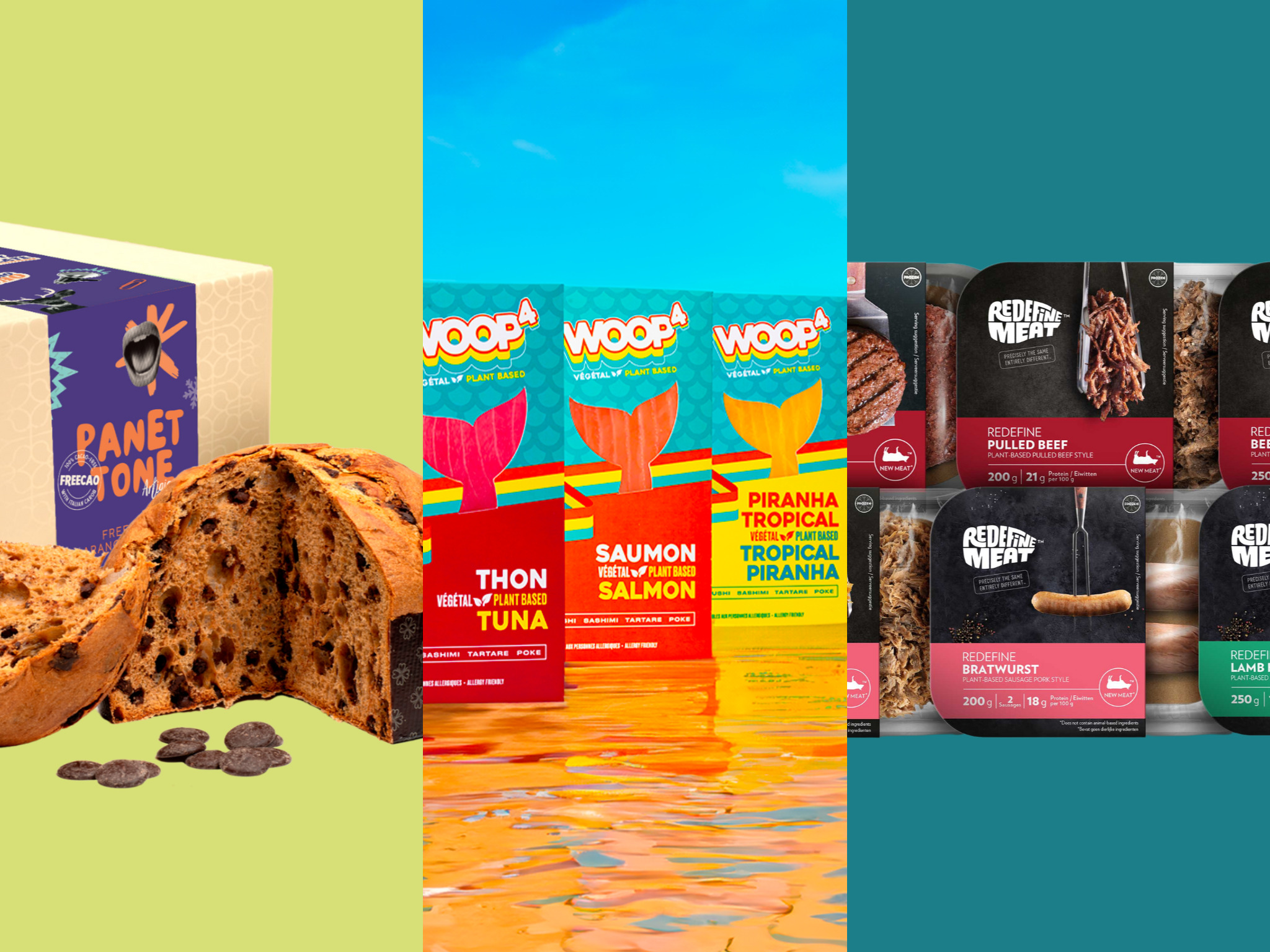
In our weekly column, we round up the latest news and developments in the alternative protein and sustainable food industry. This week, Future Food Quick Bites covers the launch of Italian Christmas desserts made from cocoa-free chocolate, a new kind of seafood analogue, and an alt-dairy campaign for Swedish schools.
New products and launches
If you’re looking to cook 3D-printed meat, Isreal’s Redefine Meat has finally entered European retail with its ‘new meat’ products, six of which (two pulled and four minced) are debuting at Ocado in the UK and Albert Heijn and Crisp in the Netherlands.
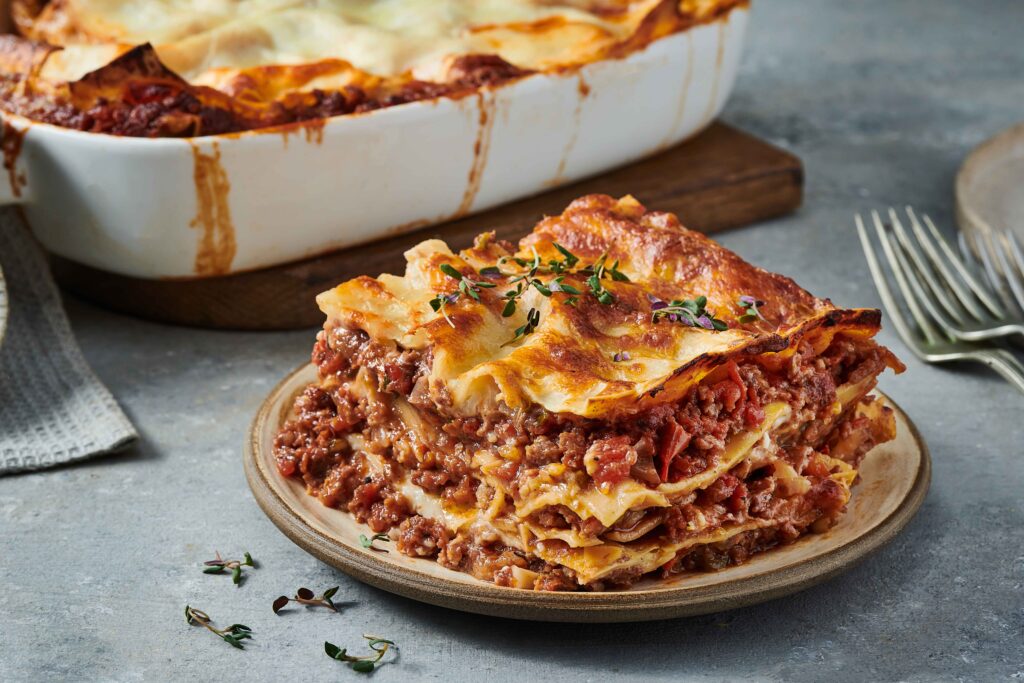
Another beef launch has come from German manufacturer BENEO, which has unveiled two semi-finished products for plant-based alternatives – beef bites and mince. The pea- and mycoprotein-based innovations will be launched next year but were sampled at Fi Europe in Frankfurt last month.
More beef: whole-cut meat maker Chunk Foods‘ vegan steak is headlining a culinary experience at this year’s Art Basel Miami Beach by chef Paul Qui, as part of a Philly cheesesteak with cashew queso.
No more beef? Then McDonald’s New Zealand has got you covered with its Salad Burger, which feels like a slant for non-meat-eaters. That’s right, it’s just… salad ingredients in a bun, in an apparent response to Burger King’s version of the same thing in the country (which still has onion rings!).
Over in the dairy alternatives world, UK chocolate maker LoveRaw is expanding into the Netherlands, with its milk chocolate wafer bar available in about 200 Albert Heijn stores, and milk and white chocolate bars in 150 Shell stores.

Hong Kong, meanwhile, has a new plant-based milk. Singapore-based Oatbedient has launched its oat and milk powders in original, chocolate and chia seed flavours. They’re available at select Market Place, 3hreeSixty and Wellcome stores across the island.
In Italy, cocoa-free chocolate maker Foreverland has launched its first products using its Freecao alternative: pralines and the Christmas classic, panettone. The products – made from carob-based chocolate – are available on its website, with the latter costing €32.90 for a kg.
UK vegan pizza chain Purezza has partnered with Chefs for Foodies to offer its vegan mozzarella as part of a create-your-own-pizza kit for home cooks, which comes with Quorn pepperoni, chopped tomatoes, red onions, fresh basil, dough balls, and – in a wonderful touch – flour for dusting.
Elsewhere, Canadian food tech company Cult Food Science has launched a third proprietary plant-based pet food ingredient, Bmeaty, which joins existing products Bmmune and Bflora. It’s made from yeast extract, hydrolysed yeast and carrier yeast, and boasts 40% protein, and the ingredients will appear in several pet food formulations next year.

Also in Canada, WOOP4 is a new alt-seafood brand with one product we’ve never seen before – a vegan piranha. Its lineup includes rice-protein- and konjac-based salmon and tuna alternatives as well, alongside a range of seafood-complementing flavoured mayos. You can buy these at certain indie food stores or online.
Another company that recently launched plant-based seafood products was CPG giant Nestlé – but it says that won’t be the focus of its upcoming plant protein portfolio in India. The company hints at innovations “more relevant to the Indian market”, but is keeping its cards close to its chest. Watch this space!
And California’s Heyday Canning Co. opened what became a TikTok-famous bean pop-up in New York City, with huge lines outside the viral store surpassing the expected footfall. The idea was to exchange a can of beans for Heyday beans, which would be donated to the food bank City Harvest. As co-founder and CEO Kathryn Kavner said: “People frigging love beans.”

Finance and M&As
WNWN Food Labs, the UK brand making cocoa-free chocolate, has successfully completed the CoLab Tech accelerator with Mondelēz International. It will showcase its alt-chocolate bars, truffles and coated biscuits at the food giant’s North American HQ.
In Germany, food conglomerate Pfeifer & Langen has acquired a majority stake in sausage-maker-turned-vegan-meat brand Rügenwalder Mühle for an undisclosed amount, with product development and international expansion high on the agenda.
Fellow German brand MyriaMeat – founded by researchers at the University of Göttingen – has emerged from stealth mode claiming to be able to make cell-cultured whole-cut meat, and has already seen €40M in investment.
Australian food producer Wide Open Agriculture has received investment and a distribution deal for its lupin proteins from Sweden’s Ingå Group, which has injected $825,000 into the former and acquired roughly a 15% stake at a pre-money valuation of $4.8M.
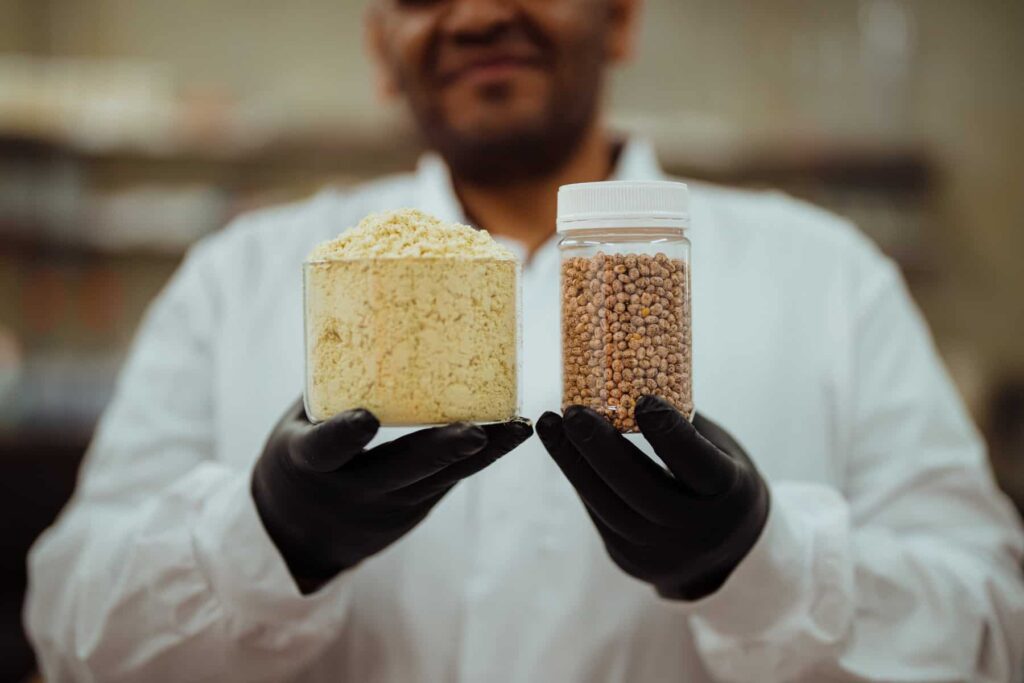
In the US, precision fermentation company Liberation Labs has secured a $25M loan from the USDA to support the construction of its 6,000-litre-capacity biomanufacturing hub, amid a Series A round it hopes to complete by the end of Q1 2024.
Similarly, New York-based biomanufacturing company Synonym has raised funding from Open Philanthropy to expand its research into gas fermentation tech to produce planet-friendly proteins and other foods.
In sadder news, Floridian duckweed startup Lemnature AquaFarms, which develops proteins and fibres from lemna, has filed for bankruptcy, with an online auction for its assets being held on December 12.
And things are shaking up at the top for Simulate and its sub-brand Nuggs, with co-founder and CEO Ben Pasternak leaving his role amid investor pressure. Co-founder Sam Terris (previously COO) is taking over.
Policy developments
Cellular Agriculture Australia, a Melbourne-based non-profit, has launched a tool to standardise terminology across the cell ag industry. The Language Guide used input from leaders across APAC, and one of its recommendations chimes with previous research revealing that ‘cultivated meat’ is the preferred term for cell-based proteins.
Italy, meanwhile, has resubmitted its cultivated meat ban proposal to the EU, which might mean a breach of the single-market rules and hefty fines. Now, Italian policymaker Alessandro Caramiello is hosting an “informal dialogue” on the subject today.
The UK government’s new National Vision for Engineering Biology is investing £2B in R&D and infrastructure over the next 10 years, including in the country’s cultivated meat sector, as it says there’s a critical shortage of infrastructure for alt-protein scale-up, and making cultivated meat doesn’t require “over-engineered” equipment like the life sciences sector.
British microbial oil company Clean Food Group has received government funding too, with the £1M, 18-month project helping the producer scale up the manufacturing of its functional oils, including its palm oil alternative.
In the EU, the European Parliament Committee on Fisheries (PECH) discussed the use of fish-related terms for plant-based foods, where the European Vegetarian Union argued that people aren’t confused with these labels. Newly launched alt-seafood association Future Ocean Foods was also present.
Meanwhile, two research centres on climate and sustainable food are in the works in Ireland, backed by €70M in funding. The former will focus on the climate, biodiversity and water, and the latter on researching sustainable and resilient food systems, convening academics, industry and policymakers from Ireland, Northern Ireland and the UK.
The Czech Chamber of Deputies recently held a seminar promoting plant-based diets in the country for a healthier and more sustainable food system, with the parliament acknowledging the links and encouraging a shift towards vegan eating.
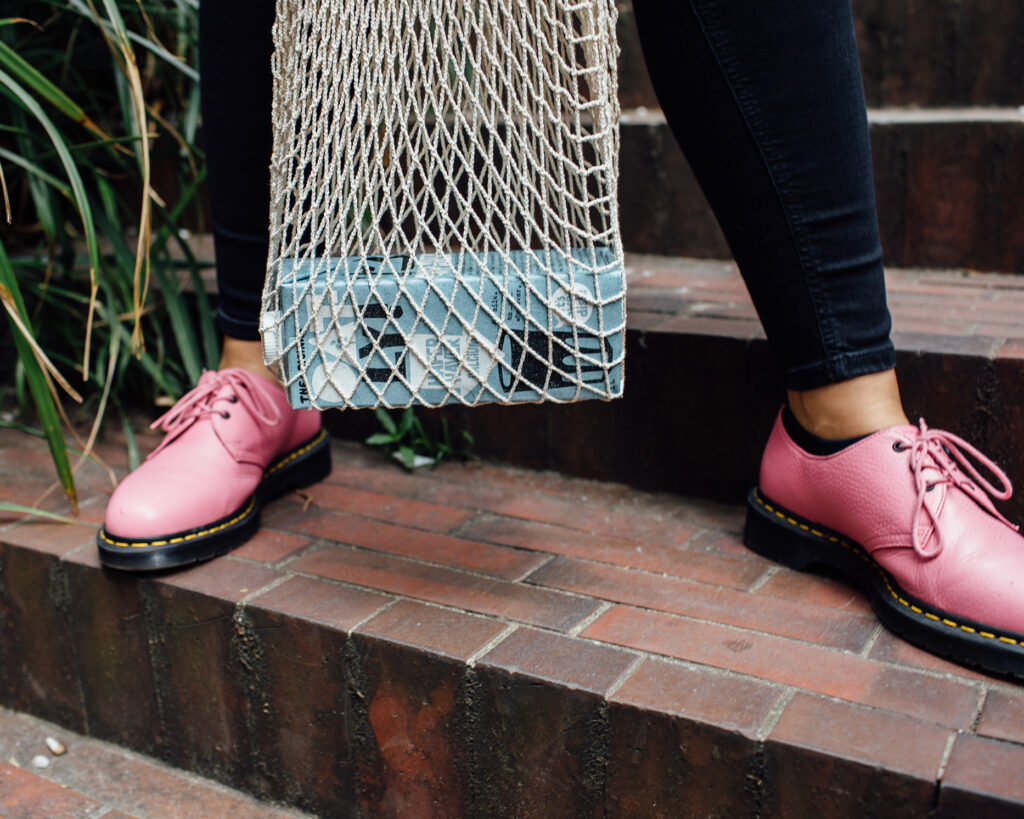
In the Nordics, alt-dairy brands under the Plant-Based Sweden banner – including local Swedish favourites Oatly, DUG, Sproud, Planti and Oddlygood as well as international giant Alpro – have sent a letter to the government to include plant-based milk in the upcoming EU School Scheme review.
Further news from the region comes from Finland, which has a new Plant Based Food Finland consortium, headed by Oatly’s public affairs manager Niklas Kaskeala. There are 18 founding members which include Oatly, Lidl, WWF Finland, Nordic Umami Company, and Mö Foods among others.
Manufacturing and awards
And in news involving both these countries, Finnish company Fazer is moving the manufacturing of oat milk and oat-based cooking products to its Tingsryd factory in Sweden, with the facility in Koria, Finland focusing on oat yoghurts. The move – first mooted two months ago – will see 64 employees lose their jobs.
Meanwhile, the partnership between Israel’s Profuse Technology and Estonia’s Gelatex is bearing fruitful results, shortening the growth cycle of cell-cultured chicken muscle tissue to just 48 hours, with a fivefold increase in protein content.
In another partnership, French cultivated meat company Vital Meat has established a strategic link-up with cell-culture media producer Biowest to achieve successful repeat pilot productions of cultivated chicken in 250-litre bioreactors.
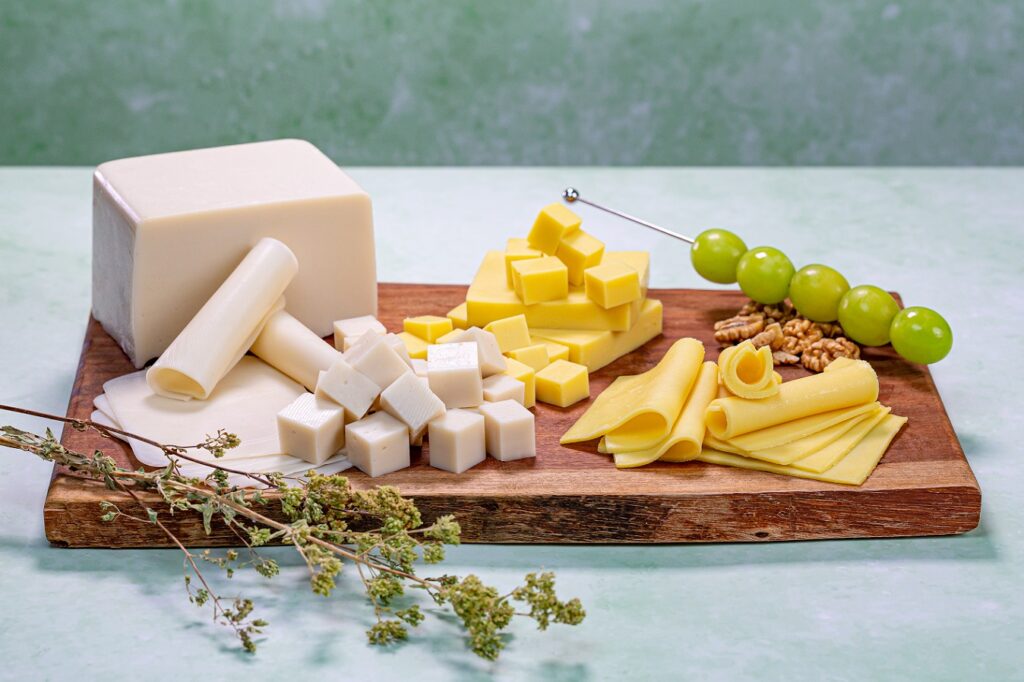
Finally, at the Fi Innovation Awards, Hi-Food and Alianza Team Europe won the plant-based innovation award for their oil-based emulsions replicating animal fat attributes, alongside ChickP Protein for its 90% chickpea protein isolate. MycoTech won the health innovation award for its shiitake-fermented pea and rice protein powder. Meanwhile, Arkeon Biotechnologies received the Startup Challenge award for the most innovative plant-based or alternative ingredient – it makes proteins from air.
Check out last week’s Future Food Quick Bites.
The post Future Food Quick Bites: Panettone, Piranhas, Powders & Plant-Based School Milk appeared first on Green Queen.
This post was originally published on Green Queen.